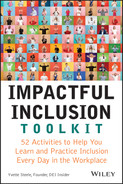ACTIVITY 28
Reframe Difficult Conversations on Polarizing Topics
“You must let suffering speak if you want to hear the truth.”
—Cornell West
***
Social inequity is more pronounced now than in previous decades—or at least more of us have become aware of it. We never know what's going to be served in the workplace from day to day. Between acts of hate and violence and movements to maintain or disrupt power, we can be just minutes away from crises or chaos at any moment in time. Sure, the work is constant, but the conditions under which we must perform can vary greatly from person to person. When a casual conversation with a colleague suddenly shifts to race, a polarizing political view, legislation impacting the LGBTQ+ community, or something else that makes us highly uncomfortable to talk about, we tend to avoid it all costs as such discussions can become extremely emotional (see Figure 28.1). We fear that anger and resentment may build or we'll be misunderstood, say the wrong thing, be thought of as racist, sexist, or homophobic, or worse—lose our job. Work relationships may be forever damaged. When the fight or flight response kicks in during difficult conversations, many will choose the flight every time. Rather than muster the courage to lean in, the option to quickly change the subject or abruptly remember that we're running late for a meeting lies just beneath the surface and is far more appealing. After all, we are wired to choose pleasure over pain.

Figure 28.1: Courageous conversations trigger emotions.
The degree to which we welcome or avoid conversations that we find difficult determines whether we are building or blocking a culture of inclusion. Before running from the next opportunity to have a difficult conversation, consider the impact of not having it—a culture of silence that festers and diminishes one's sense of belonging, reduced productivity, and the potential to negatively impact one's mental health over time. Reframing these interactions from difficult conversations to courageous conversations is more empowering. It helps us to boldly be part of the solution. This is our opportunity to do better. Courageous conversations involve intentionally giving space to complex issues. They are courageous in that they require bravery to sit in discomfort long enough to explore one another's feelings and vulnerabilities—especially when racial and social injustice are prevalent or dominating the media. The challenge of doing the work to uproot assumptions, not judge, share our experiences, and hear the experiences of others is part of the process. Accept it. Courage and self-awareness are required if we are ever going to connect, understand another's lived experience, and be understood. Courageous conversations can bring about allyship, increased awareness of the impact of a situation, and validation of difficult experiences. Yup. That mass shooting did just happen, killing innocent people of color. Yup. It's the second one in as many months. Yup. Nothing yet has brought about change. Yup. The next time it may be me or a loved one. Yup. These feelings of fear, helplessness, anger, and pain have followed me and/or a co-worker into the workplace. Yup. Here, many of us sit trying to simply get through the day under a cloud of emotions and are expected to produce as if nothing has happened. Considering that this narrative may be the dialogue playing in one's mind, the fact remains that we must be open to other people's experiences that are not necessarily similar to our own. We must be mindful of the multiple perspectives born from an individual's background, experience, and identity. While you may be a White person who has never been profiled and threatened by a police officer on your way to work, the idea that that just happened to your Black colleague simply because they were Black may be something that is completely alien. White people may now feel villainized for the first time and unsure of how to interact with people of color as awareness of the atrocities marginalized groups experience at the hands of Whites now and throughout history is more prevalent. These feelings and attitudes have increasingly become a part of workplace culture, and having courageous conversations is the best way to hear and be heard so together we can figure out a way forward (see Figure 28.2).

Figure 28.2: Lack of courageous conversations diminishes productivity.
Sadly, many in the workplace remain oblivious to the aftermath of hate-based violence, laws that further marginalize underrepresented groups, and the massive civil unrest as it does not affect them. Walking away or putting our heads in the sand is not a privilege that everyone has. We must approach with a curious mindset and ask ourselves soul-searching questions like these:
- How would I feel if I were in this situation?
- Why do I care, and what do I care most about?
- How have I been personally impacted?
- What are the roadblocks to change within the organization that I can influence? (Nothing is too small.)
- What am I willing and able to do to empower/support/advocate for others?
- How can I leverage my power and privilege to improve someone's experience today?
- What do I lose when I avoid courageous conversations, and how could my life improve when I embrace them?
The most valuable work happens between people who are willing to understand and learn from one another. It is possible for each of us to support one another during social unrest whether we're from an oppressed or marginalized group or a visionary with race, class, or sex privilege. Everyone is affected at varying degrees regardless of who they are or where they come from (see Figure 28.3). The impact of these divisive times is a lot like the air we breathe. We all are in it, and we can choose how we want to respond with the awareness that no response is a response.

Figure 28.3: Remember remote colleagues.
Actions
Become Skilled at Having Courageous Conversations
Courageous conversations are unchartered territory for most of us. Knowing how to have them will lead to better outcomes. Access tools to help shape and guide conversation. Check out the following resources:
- The Denver Foundation:
www.nonprofitinclusiveness.org/agreements-courageous-conversations-and-active-learning - PsychologistsOffTheClock.com: Podcast episode 96. Effective Conversations About Diversity with Anatasia Kim and Alicia del Prado, by Debbie Sorensen,
offtheclockpsych.com/diversity-conversations/#:~:text=Discussions%20of%20diversity%20issues%20are%20more%20critical%20than,leading%20to%20anger%20and%20hurt%20on%20both%20sides - Blog.XYplanningNetwork.com: “How to Have Difficult Conversations About Diversity,”
blog.xyplanningnetwork.com/advisor-blog/how-to-have-difficult-conversations-about-diversity
Leverage Your Self-Awareness Developed in Activity 1 and Activity 2
When we are self-aware and in touch with our why, it is easier to have courageous conversations. Understanding our emotions helps us to view situations more objectively and avoid responding in ways that may be perceived as defensive. We must be open to the possibility that the way in which we see things is not necessarily the right way or the only way.
Say the Unsaid
Resist the posture of walking on eggshells when navigating these conversations. No tiptoeing around the issues. The proverbial “elephant in the room” will remain until acknowledged. When we acknowledge and accept the fact that the conversation can trigger feelings of discomfort and strong emotions, we are not surprised when they do. Thus, we are better prepared to relive it. Bring empathy to the conversation by considering the other person's frame of mind. Remember to breathe to manage the anxiety.
Create Space to Listen to One Another
Bear in mind that everyone is the expert on their own experience. Trust that what they are sharing is valid. Avoid judging and blaming, as this may be pointing out fallacies in our own thinking. Our role is not to alter their perspective or prove whether something is true. It is true for them, and that is what matters most. Honor the space with humility, trust, and respect.
Action Accelerators
- Medium.com: “How to Talk About Racism at Work, Hint: It's Not as Scary as You Think,” by Ajah Hales:
medium.com/our-human-family/how-to-talk-about-racism-at-work-7f27da56158a - HBR.org: “High-Performing Teams Need Psychological Safety. Here's How to Create It,” by Laura Delizonna:
hbr.org/2017/08/high-performing-teams-need-psychological-safety-heres-how-to-create-it - Book: We Can't Talk about That at Work! How to Talk about Race, Religion, Politics, and Other Polarizing Topics, by Mary-Frances Winters:
www.amazon.com/Cant-Talk-about-That-Work/dp/1523094265/ref=sr_1_3?crid=3JBCCP4867TW1&keywords=mary+frances+winters&qid=1653145706&s=books&sprefix=mary+frances+winters,stripbooks,122&sr=1-3 - YouTube.com: What White people can do to move race conversations forward, Caprice Hollins, TEDxSeattle:
www.youtube.com/watch?v=7iknxhxEn1o
